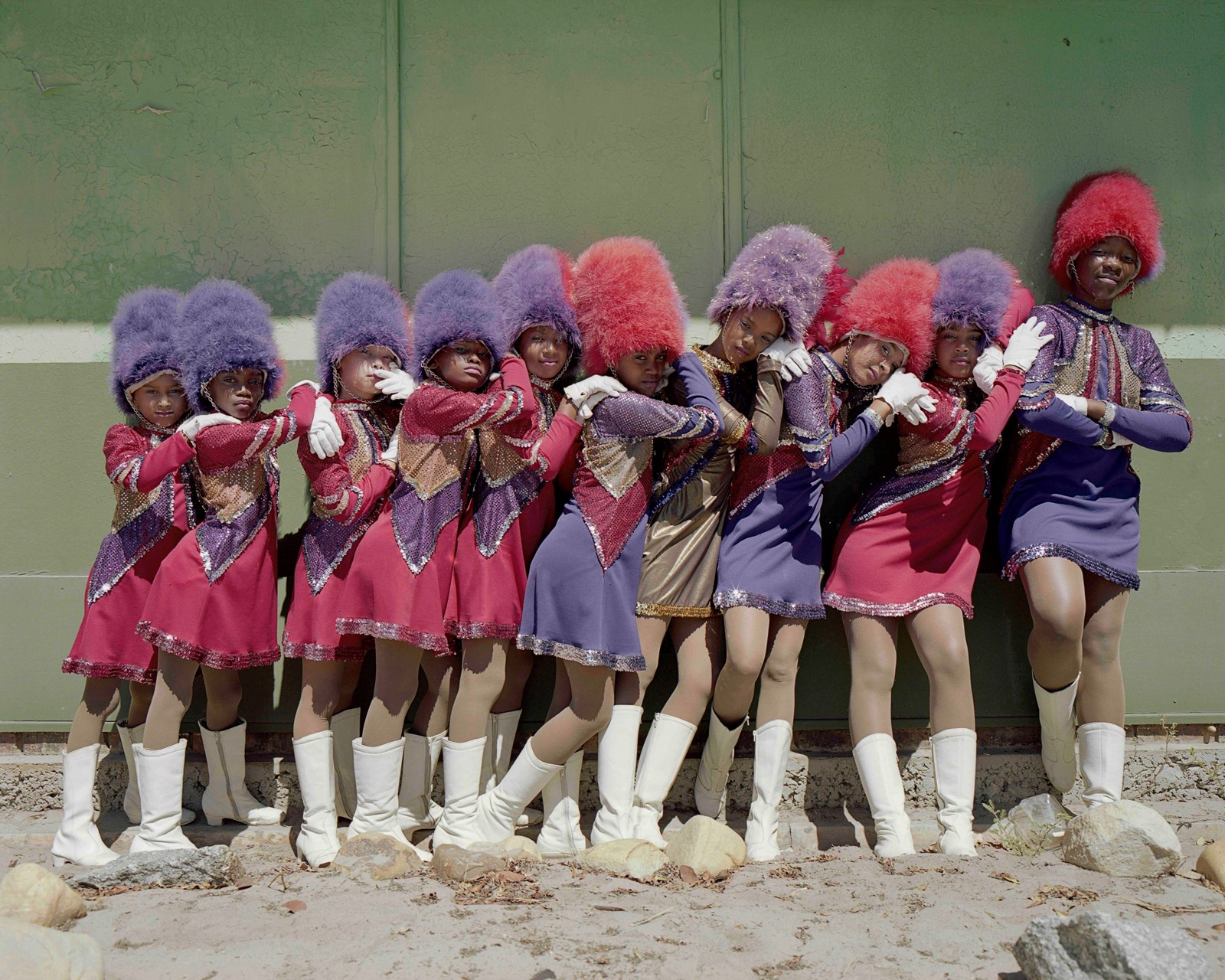Young female squads of drum majorettes, or ‘drummies’, march, prance, wave flags and twirl batons in formation, competing between schools. Many are found in marginalised areas of Cape Town, South Africa, where photographer Alice Mann first encountered their culture. “There was a story on the front page of a local newspaper about local residents complaining about the noise from the practice sessions,” she tells AnOther. Mann was both intrigued and struck by the need to correct the injustice of the complaints; to her the girls looked like heroes.
After cold-calling the school, Mann got permission to shoot portraits of the majorettes, returning several times. Over a period of four years she googled then built relationships with schools in Western Cape and Gauteng, in her hometown of Cape Town. The portrayal of strength, joy and the sheer attitude and bravado of the girls in power uniforms unsurprisingly blew up when Mann shared them with the world. The series won The Taylor Wessing Photographic Portrait Prize in 2018, when Mann was still only 27.
Drummies was featured in The New Yorker, and the photos have been shown in galleries around the world, cementing Mann’s name in the world of photographic art. David Hill Gallery in west London, which shows both established and lesser-known photographers with an emphasis on previously unshown work, is currently showing the series. Mann worked with Hill to curate the first London solo show of Drummies, including previously unseen shots, like some older adolescent girls whose portraits bring a new layer to the work. Drummies also exists as a sumptuous photo book published by Gost.
Below, Alice Mann talks about how she got to this point.
Naomi Attwood: How and when did you get into photography?
Alice Mann: I didn’t take many photos apart from for MySpace before university. I originally intended to be like my art director cousin, the only person I knew with a creative career. There was an advertising college, but my parents thought a degree would be better to get a job, so I chose Fine Art at Cape Town University – not great for getting jobs but I loved it.
I was inspired by other students making beautiful prints in the darkroom, and by the guest speakers, like Rineke Dijkstra. I was obsessed! I cry when I look at her work. She spoke about how she finds beauty in the ordinary and how the ordinary can be extraordinary. I realised work doesn’t have to be breaking news or a new discovery. Showing something people do every day can still be powerful.
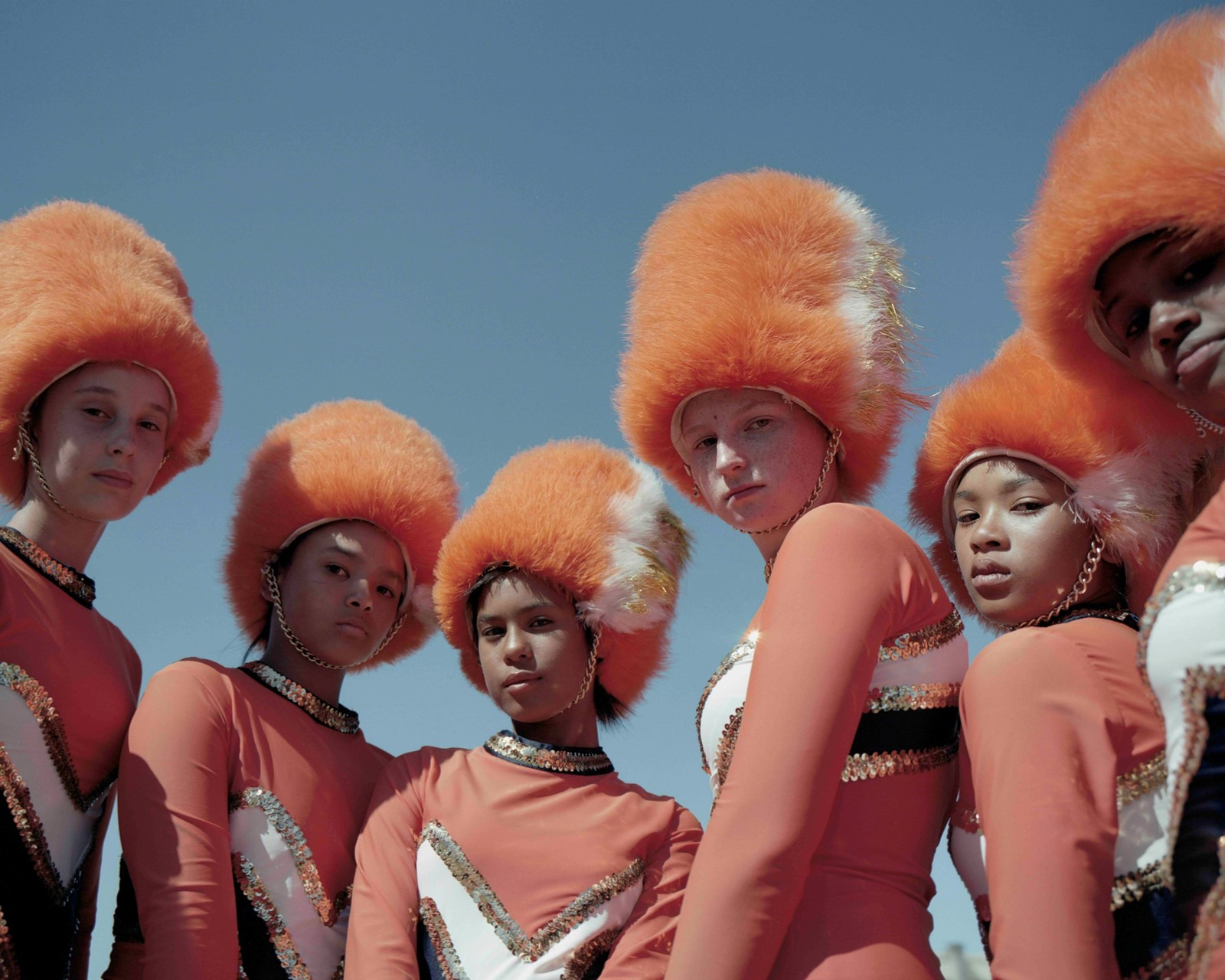
NA: Any other formative influences?
AM: I interned with [documentary photographers] Adam Broomberg and Oliver Chanarin, then interned with documentary photographer, Gideon Mendel who came up in the 80s and 90s, then worked for him in London. I learned a lot, he’s a great teacher. He’s not easily impressed, which taught me to critique my own work.
Gideon worked on a long-term project about flooding and climate change called Drowning World, which he would return to whenever he had the chance. I began to understand how a photographer earns their living. My parents didn’t come from the arts, so Gideon was a great mentor.
“So much of my work is unpacking what it means to be a white, middle-class woman in South Africa” – Alice Mann
NA: How would you describe Cape Town to someone who’s never been there?
AM: I was born and grew up in Cape Town, lived in London from 2014 until 2021, then moved back. Now I’m back in London. Everybody knows South Africa’s recent history; the policy of apartheid; that we only became a democracy in 1994. To this day, Cape Town is very fractured, with a lot of inequality. We haven’t fixed our social problems yet. Even the architecture of the city was based on separation. The wealthy [white] areas are closer to the centre and mountain, and it becomes less and less wealthy [and more Black] the further away from the centre. So much of my work is unpacking what it means to be a white, middle-class woman in South Africa.
At the same time, it’s extremely beautiful with an amazing sense of space. African culture is very positive and optimistic despite the challenges people face, which makes it very inspiring and exciting.
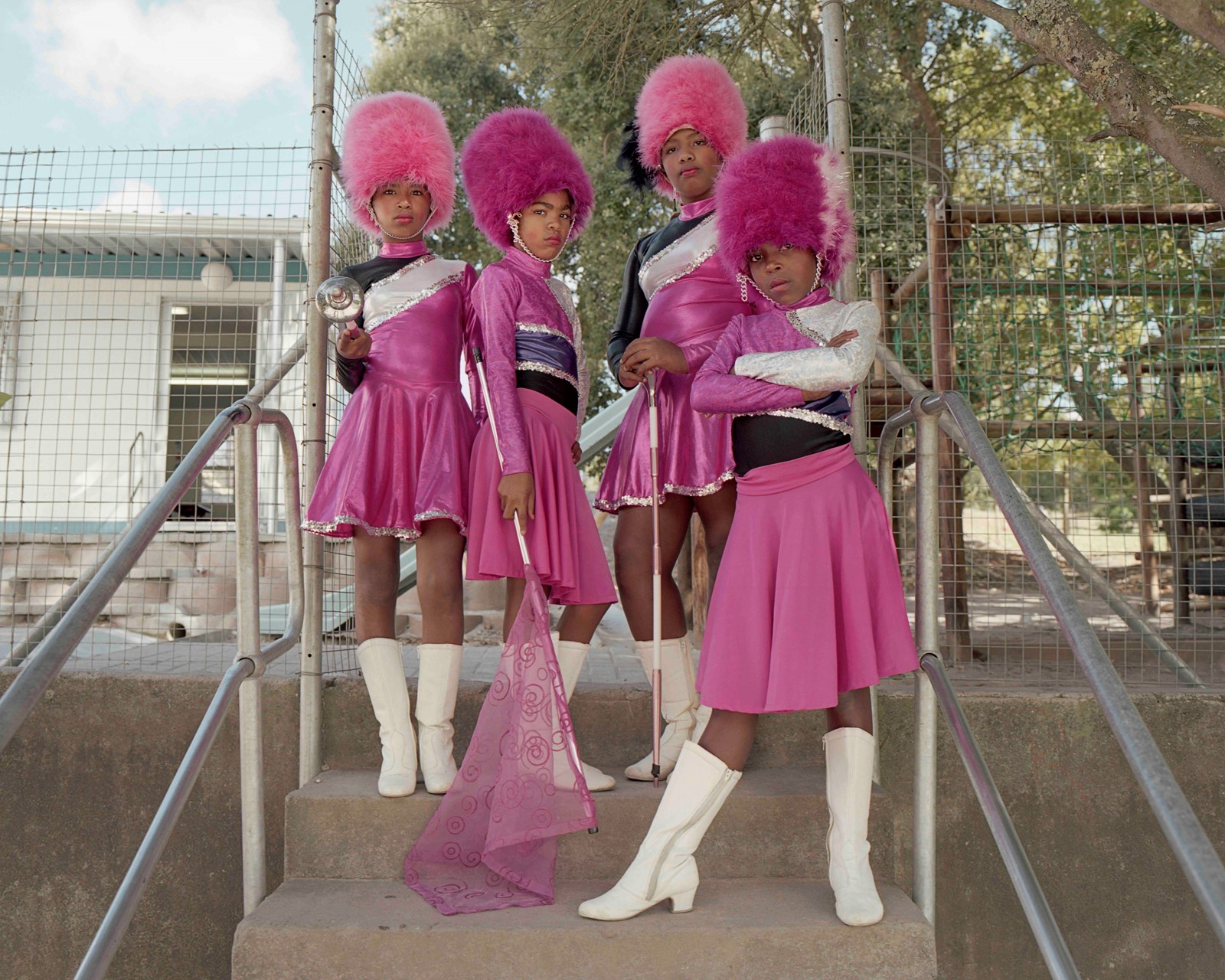
NA: How do you choose your subjects?
AM: I don’t feel drawn to photographing people I know; I like discovering new people via photography. I enjoy the process, research, the initial meetings. I always give people prints or Polaroids, and I shoot sitters again and again. When I return to people’s houses and see a portrait I took, that’s the best feeling.
I have an ongoing interest in dress and uniform; people stepping into a uniform and performing a role, which I’ve explored in other works, like The Night is Young, a series about South African graduation balls, and Maximum Effect (La Sape D’Europe), about Congolese men in London, who dress in a specific, dandy style.
Working with women and representing them in a certain way is a theme I return to. I like the fluidity and duality of women – they can be anything and that is so exciting. I try to shoot the person the way they want to be seen.
“I wanted to show my respect for their confidence, the sense of belonging and pride in their identities – the images are not othering, but convey a sense of empathy” – Alice Mann
The initial Drummies shots were nice, but I wanted to do better. I returned with my film camera and they directed each other – taking charge of the shoot! I absolutely loved working with kids, explaining the camera. When the pictures were developed, I realised that approach produced a special energy.
NA: When starting a new project, are you more excited by the image you’ll get, or meeting the person?
AM: Both! If anything, the person. I’m a people person for sure and I really want to learn their story.
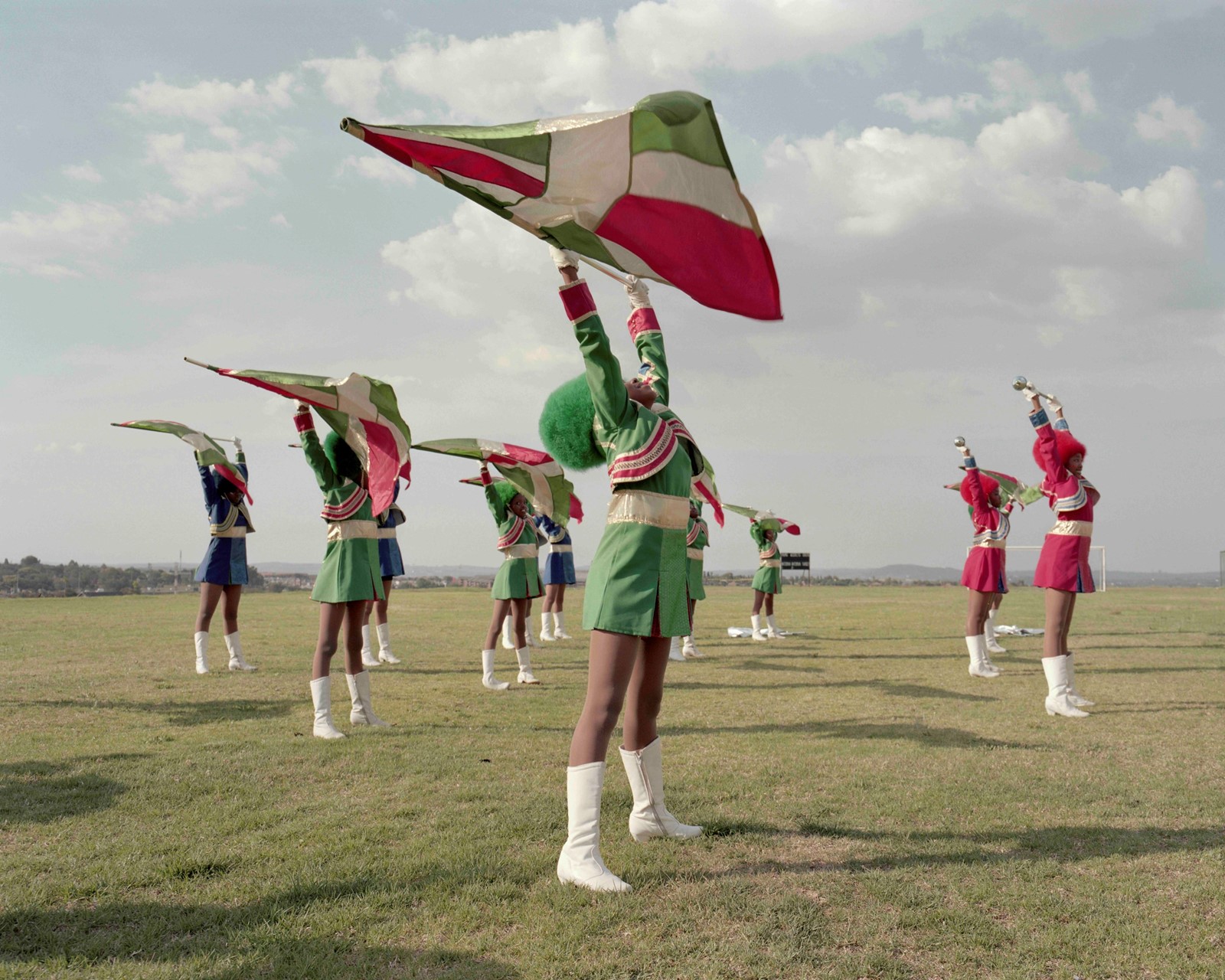
NA: During the moment of shooting, do you chat to your subjects?
AM: I’ll always chat [Laughs]. I want to find out all about them. Unless they are very quiet, then I’ll match their energy.
NA: How do you feel about the response to Drummies?
AM: I’m not amazed, because I knew the project was special, but I’m happy that people resonate with the images – even years later. I’m grateful to the people I worked with.
I wanted to show my respect for their confidence, the sense of belonging and pride in their identities – the images are not othering, but convey a sense of empathy. Some of the settings aren’t very privileged and [South Africa is] a patriarchal society. These young women put their uniforms on, strut and tell the boys to get out of their way, which I thought was beautiful to see. They’re totally emboldened in that moment, and I wanted to tap into that.
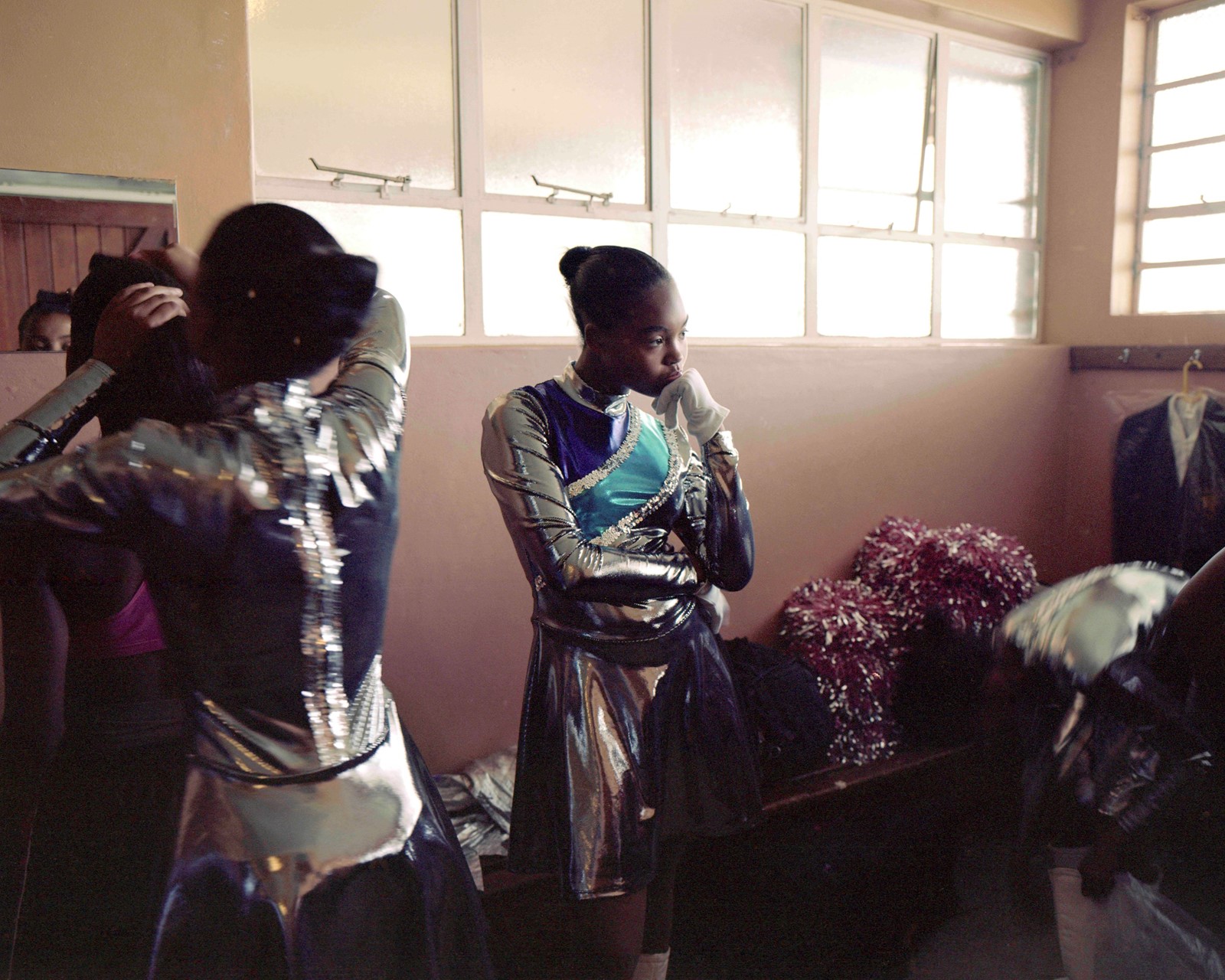
NA: Are you familiar with Architectural Digest?
AM: The Dakota Johnson video? That was a surprise ...
[In a 2020 AD video of her home, Johnson shows off a Drummies print, saying Mann is “an amazing photographer” and the girls’ “energy is amazing, and it makes me feel hopeful”.]
Drummies was featured in The New Yorker in 2018, and Dakota’s assistant emailed requesting to buy a print. I had to create an edition system because I hadn’t sold prints privately before. When AD asked permission to feature the work, I thought maybe it would be glimpsed in the background. It’s a weird experience to see her talk about it and I’m glad that she gets the meaning of it.
Drummies by Alice Mann is on show at David Hill Gallery in London until 30 November 2024.
